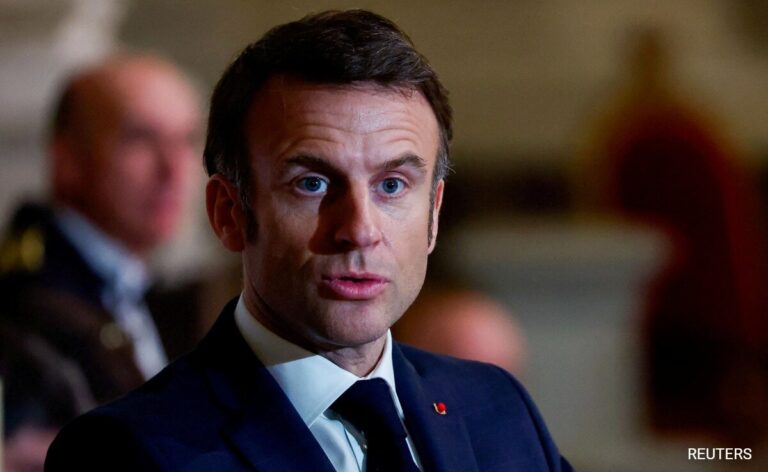Emmanuel Macron has taken many risks in a political career marked by countless crises, but the decision to call early elections is one too many, one that could tarnish his legacy and herald an era of extremes.
Confusion over Macron’s dissolution of the National Assembly following crushing defeats for centrist parties in European polls remains strong, and even those close to the president acknowledge fears of political turmoil.
The far-right National Rally (RN) party won the first round of legislative elections on Sunday.
Depending on the outcome of the second round of voting on July 7 next week, the party of Macron’s longtime rival Marine Le Pen could win the prime ministerial position for the first time, forcing the two countries into a tense coexistence.
Macron’s popularity has fallen, to the point where his allies have suggested that Prime Minister Gabriel Attal take the lead in the election.
For one of Macron’s staunchest supporters, some of the resentment stems from his unexpected ascension to the presidency.
“There is a sense of revenge among politicians who resent his success,” said François Patriat, head of Macron’s senate clique.
The ever-defiant Macron, in a statement as the initial election results were announced, stressed “the importance of this vote for all our citizens and our desire to clarify the political situation.”
“Hopeless optimist”
Born in Amiens to doctor parents, Macron met Brigitte, a teacher and 25 years his senior.
“He fell in love with his drama teacher when he was 16, said he was going to marry her, and then he got married – that’s pretty strong stuff,” said a former classmate at the elite graduate school ENA.
It was with the same confidence that he left the government of former President François Hollande in August 2016 and prepared to run for president, a risky move at the time.
He then launched a political movement named “En Marche” (“Forward”), named after the leader, and won the presidential election in 2017 at the age of 39.
Macron called himself a “hopeless optimist” and later said he had made the breakthrough “because France was dissatisfied and anxious.”
Optimism about the former Rothschild investment banker, who once advocated “revolution” in his books, quickly soured after he took office due to his economic policies.
He served as economy minister under the Socialist government and earned a reputation as “the president of the rich” after announcing early in his administration that he would abolish taxes on high-income earners.
Then last year, Macron’s move to raise the retirement age from 62 to 64 sparked mass protests and reinforced the perception that he was out of touch with public opinion.
“A lot of people think I’m arrogant,” he says, noting that some early jokes, such as his suggestion that unemployed people only need to “cross the road” to find work, have landed him in trouble.
Now 46, he believes his economic record speaks for itself, with France considered the most attractive country in Europe for foreign investment and an end to mass unemployment.
But for many, Macron’s centrist promises could not withstand the waves of crises at home and abroad, or pressure from the far right.
“Lack of humility”
The “yellow vest” anti-government movement, the COVID-19 pandemic and the war in Ukraine are just some of the challenges Macron has faced during his time in office.
Despite his declining popularity at home, Macron remains a key voice in European politics.
“We shouldn’t quibble over details. He is the great European of his time,” said French-German ecologist Daniel Cohn-Bendit, adding that Macron’s problem is that he is “convinced he is right”.
Macron offered to work with allies to help after Russia’s invasion of Ukraine in 2022, but frustrated many by continuing to negotiate with Russian President Vladimir Putin.
But two years on, Macron has faced criticism for his hardline stance – he has not ruled out sending troops to Ukraine, and other Western countries have accused him of being unnecessarily inflammatory.
The late former mayor of Lyon, Gerard Collomb, was more direct in his criticism, pointing to Macron’s “arrogance” and his government’s “lack of humility.”
Part of the problem is the perception that Macron is increasingly isolated, one former adviser said.
“He has no grassroots network, and neither do the people around him, who do not represent the mood of the times,” they added.
While the first lady is seen as a moderate, Macron has moved to the right and some have accused him of being an opportunist.
“Changing opinions”
On the night of his 2017 presidential election victory, Macron vowed in front of the Louvre to do all he could to ensure that French people “won’t have any reason to vote for extremists.”
But for many, the young centrists they voted for are moving further and further to the right, creating space for other extremes to rise.
The same man who took inspiration from the anti-capitalist party’s slogan to win re-election in 2022 later adopted the words of far-right figure Eric Zemmour: “So that France remains French.”
For Le Pen, who sees a chance at becoming president in 2027, Macron has “flexibility and incredible self-confidence, which are both his strength and his weakness.”
A former special adviser sees that flexibility differently.
“He is turning his back on 2017 and on humanitarian values,” said Philippe Granjon. “There is no shift to the right… The president is simply adapting to changing public opinion.”
Macron rejects the criticism and says ultimately he can only rely on himself. “The most difficult decisions are the ones you take yourself,” he said.
(Except for the headline, this story has not been edited by NDTV staff and is published from a syndicated feed.)

